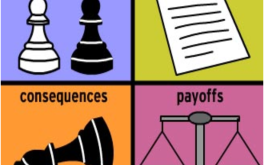Robert Boyer sur le capitalisme et la pandémie Pour qualifier la crise que nous traversons, les économistes oscillent entre « crise sans précédent », « récession la plus grave depuis 1929 », ou encore « troisième crise du siècle » – après celles des subprimes de 2008 et de l’euro en 2010. Qu’en pensez-vous ? Le terme de « récession » s’applique au moment où un cycle économique, arrivé à une certaine étape, se retourne pour des raisons endogènes – ce qui...
Read More »Revealed preference theory — much ado about almost nothing
Revealed preference theory — much ado about almost nothing Twenty-seven years ago yours truly wrote an article on revealed preference theory that got published in History of Political Economy (no. 25, 1993). Paul Samuelson wrote a kind letter and informed me that he was the one who had recommended it for publication. But although he liked a lot in it, he also wrote a comment — published in the same volume of HOPE — saying: Between 1938 and 1947, and since...
Read More »Game theory — theory with little substantive content
Game theory — theory with little substantive content I don’t see that we are even entitled to assume that reality accords to some model that humans are able to envisage … To say that Pandora knows what decision model she is facing can therefore be taken as meaning no more than that she is committed to proceeding as though her model were true … The price of abandoning psychology for revealed-preference theory is therefore high. We have to give up any...
Read More »Freier Kapitalverkehr und Freihandel
Freier Kapitalverkehr und Freihandel Das letzte Mal, dass die USA einen Außenhandels-überschuss erzielten, war im Jahr 1980. Seitdem wies das Land massive Defizite auf. Im November 2016 war die Zahl der Amerikaner, die sich zusammen mit anderen Gruppen als Verlierer des Freihandels betrachteten, groß genug, um Trump zum Präsidenten zu wählen. Das bedeutet, dass das von den USA angeführte Freihandelsregime, das der Menschheit seit 1945 beispiellosen...
Read More »Cauchy logic in economics (wonkish)
Cauchy logic in economics (wonkish) What is 0.999 …, really? It appears to refer to a kind of sum: .9 + + 0.09 + 0.009 + 0.0009 + … But what does that mean? That pesky ellipsis is the real problem. There can be no controversy about what it means to add up two, or three, or a hundred numbers. But infinitely many? That’s a different story. In the real world, you can never have infinitely many heaps. What’s the numerical value of an infinite sum? It doesn’t...
Read More »Game theory — a severe case of Model Platonism
Game theory — a severe case of Model Platonism The critic may respond that the game theorist’s victory in the debate is at best Pyrrhic, since it is bought at the cost of reducing the propositions of game theory to the status of ‘mere’ tautologies. But such an accusation disturbs the game theorist not in the least. There is nothing a game theorist would like better than for his propositions to be entitled to the status of tautologies, just like proper...
Read More »Why game theory fails to live up to its promise
Why game theory fails to live up to its promise Why, it might be objected, should the goal of social science be mere causal explanations of particular events? Isn’t such an attitude more the province of the historian? Social science should instead be concentrating on systematic knowledge. The Prisoner’s Dilemma, this objection concludes, is a laudable example of exactly that – a piece of theory that sheds light over many different cases. In reply, we...
Read More »What’s the use of economic models?
What’s the use of economic models? One can generally develop a theoretical model to produce any result within a wide range. Do you want a model that produces the result that banks should be 100% funded by deposits? Here is a set of assumptions and an argument that will give you that result. That such a model exists tells us very little … Being logically correct may earn a place for a theoretical model on the bookshelf, but when a theoretical model is taken...
Read More »MMT and the need for tax reforms
MMT and the need for tax reforms The analytical steps taken in this contribution point to a potential tax reform agenda, which would achieve useful macroeconomic and social policy objectives. The thumbnail sketch we have provided is intended to provoke others to further consider how tax reforms can serve a dual macroeconomic and social policy purpose. For example, taxing capital gains at the same rates as in the 1980s and similar moves to restore...
Read More »Evidence-based policies
Evidence-based theories and policies are highly valued nowadays. Randomization is supposed to control for bias from unknown confounders. The received opinion is that evidence based on randomized experiments, therefore, is the best. More and more economists have also lately come to advocate randomization as the principal method for ensuring being able to make valid causal inferences. Yours truly would, however, rather argue that randomization, just as econometrics, promises...
Read More » Heterodox
Heterodox










